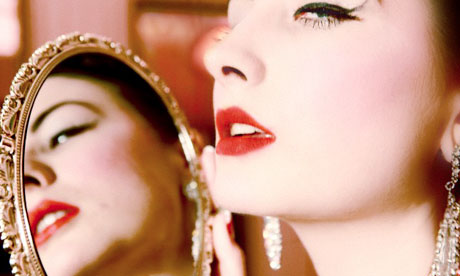
There's rarely a moment when we don't have a chance to see our own reflection, whether it's in a computer screen, a train window, the back of a spoon or even by using front camera on a mobile phone.
Yet, says a new band of bloggers, our fixation on monitoring our appearance in the reflective surfaces around us has become unhealthy. In a bid to stop obsessing over the way they look, they have started "mirror-fasting" – abstaining from looking at their reflection for anything from a month to a year.
The trend started in the US when bloggers such as Autumn Whitefield-Madrano, a 36-year-old freelance writer based in Queens, New York, launched her blog The Beheld. "I'd become aware that I had a 'mirror face'," she says. "Whenever I saw my reflection I'd open my eyes a little wider, suck in my cheeks a little and tip my chin down in an effort to make myself look more like I wanted to. It made me feel really vain."
She embarked on her first month-long mirror fast in May 2011, in an effort to become less self-conscious about her face. "I didn't want to do it because I felt bad about myself per se – I was just concerned about how often I was thinking about my appearance. I wanted to see how much my mood was affected by the way I perceived my looks."
At the end of the experiment, she reported feeling "calmer and more serene", although she admits her second month-long fast in July 2011 was more challenging. She now makes mirror-fasting an annual event: "It's my way of checking in with myself, to remind myself that I don't need to know how I look every minute to be a fully functional, capable human being."
Her fellow blogger, Kjerstin Gruys, a 29-year-old sociology graduate in San Francisco, mirror-fasted for 12 months in the runup to her wedding. She says shopping for her wedding dress "triggered a renewed – and very unwelcome – sense of vain insecurity" about her appearance. On her blog, Mirror Mirror ... Off the Wall, she wrote: "I felt ill at ease when reflecting on the dress situation. Was all that really necessary? Did my happiness over the dress outweigh the self-centred obsessing I had gone through to get it?"
As a result she avoided all reflective surfaces except for driving mirrors, and banned viewing photographs of herself. At the end of the experiment, she wrote: "I've managed to better separate my looks from my self-esteem. This is probably the most powerful secret to feeling beautiful." She is now writing a book to be published by Avery, an imprint of Penguin Books, about the experience.
A study, published in the journal Behaviour Research and Therapy earlier this year, found that British women stare in the mirror around 38 times every day and men 18 times a day.
Dr Phillippa Diedrichs, a research psychologist at the Centre for Appearance Research in Bristol, pinpoints an increased pressure in our society to look a certain way as the reason why people go to extreme measures to avoid their own reflections. "The appearance ideals we have today are unachievable for most people, so when people compare themselves to them they fall short and feel dissatisfied with the way they look."
She believes, however, that "mirror-fasting" would not have a long-term positive impact on body image. "When working with people who have issues around body image we actually encourage what we call 'mirror exposure technique' – the direct opposite of fasting," she says. "We encourage people to look in the mirror and take a less critical approach to what they see and focus on the things they like."
Kate Fox, a social anthropologist at the Social Issues Research Centre in Oxford, agrees the concept is not constructive: "It's true that avoiding something in such a dramatic and drastic manner can only be temporarily liberating. It's throwing the issue of appearance into sharp relief in the same way that crash dieting often serves to make people obsess even more about food. To me, it smacks of narcissism more than looking in the mirror like a normal person."
She also suggests that blogging about mirror-fasting is just another form of fixating on the issue of appearance. Whitefield-Madrano agrees: "I suppose I became hyperaware of how I was feeling and I started to attribute every feeling to the experiment. When I did it the second time around and had a much harder time with it, I felt like, "Oh wait, even the mirror-fast itself is a reflection of how I'm feeling."
Still, the concept has struck a chord with readers. She says: "We're now able to curate so much of our public image via social networking. I wonder if part of the reason this [mirror-fasting] speaks to people is because there's something appealing about giving up the ability to control our image in such a major way. When I've talked with people who quit Facebook they speak of it in terms similar to how I describe the mirror-fast: serenity, liberation, a feeling of knowing oneself and one's priorities better."

